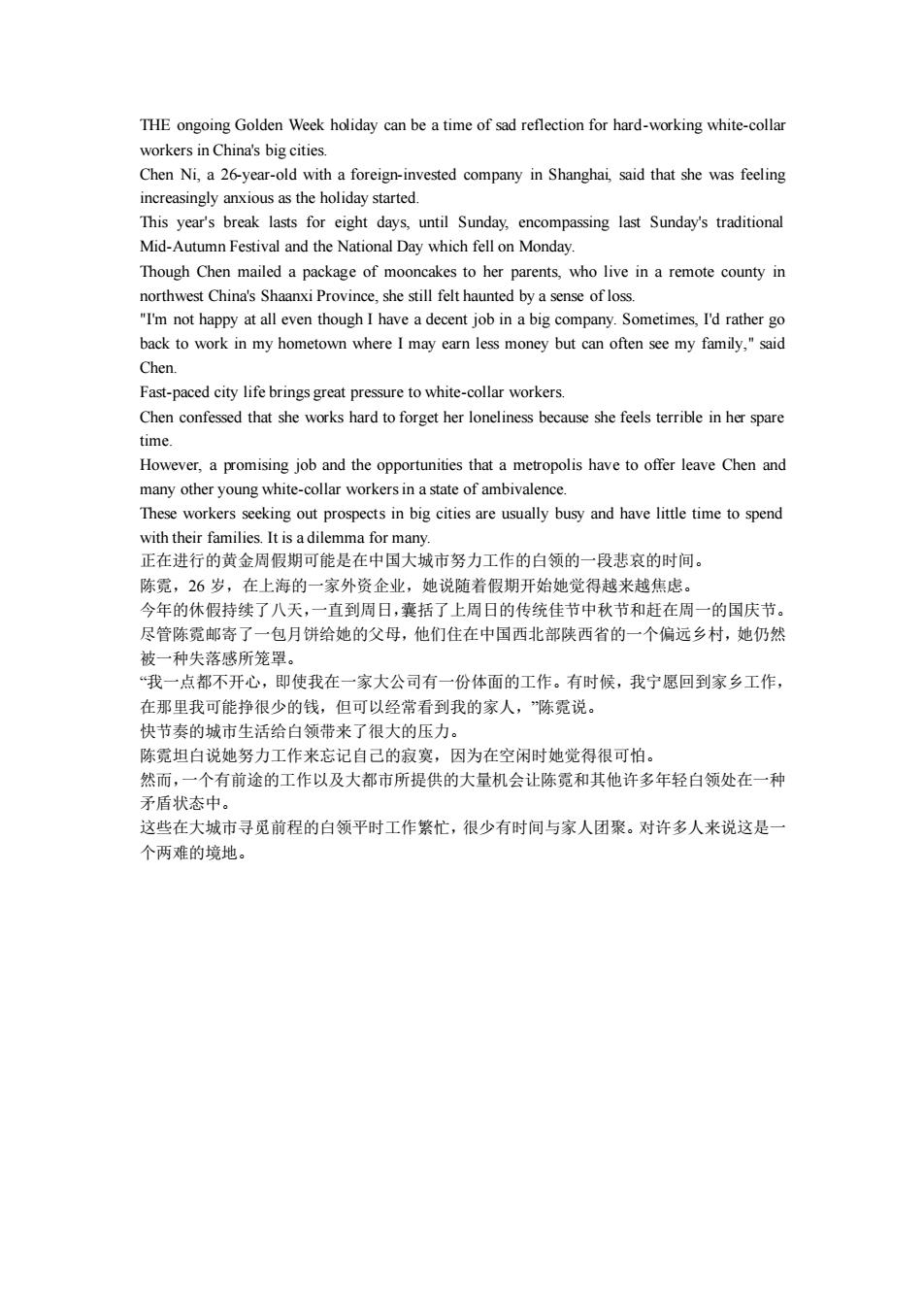
THE ongoing Golden Week holiday can be a time of sad reflection for hard-working white-collar workers in China's big cities. Chen Ni,a 26-year-old with a foreign-invested company in Shanghai,said that she was feeling increasingly anxious as the holiday started. This year's break lasts for eight days,until Sunday,encompassing last Sunday's traditional Mid-Autumn Festival and the National Day which fell on Monday. Though Chen mailed a package of mooncakes to her parents,who live in a remote county in northwest China's Shaanxi Province,she still felt haunted by a sense of loss. "I'm not happy at all even though I have a decent job in a big company.Sometimes,I'd rather go back to work in my hometown where I may earn less money but can often see my family,"said Chen. Fast-paced city life brings great pressure to white-collar workers. Chen confessed that she works hard to forget her loneliness because she feels terrible in her spare time. However,a promising job and the opportunities that a metropolis have to offer leave Chen and many other young white-collar workers in a state of ambivalence. These workers seeking out prospects in big cities are usually busy and have little time to spend with their families.It is a dilemma for many. 正在进行的黄金周假期可能是在中国大城市努力工作的白领的一段悲哀的时间。 陈霓,26岁,在上海的一家外资企业,她说随着假期开始她觉得越来越焦虑。 今年的休假持续了八天,一直到周日,囊括了上周日的传统佳节中秋节和赶在周一的国庆节。 尽管陈霓邮寄了一包月饼给她的父母,他们住在中国西北部陕西省的一个偏远乡村,她仍然 被一种失落感所笼罩。 “我一点都不开心,即使我在一家大公司有一份体面的工作。有时候,我宁愿回到家乡工作, 在那里我可能挣很少的钱,但可以经常看到我的家人,陈霓说。 快节奏的城市生活给白领带来了很大的压力。 陈霓坦白说她努力工作来忘记自己的寂寞,因为在空闲时她觉得很可怕。 然而,一个有前途的工作以及大都市所提供的大量机会让陈霓和其他许多年轻白领处在一种 矛盾状态中。 这些在大城市寻觅前程的白领平时工作繁忙,很少有时间与家人团聚。对许多人来说这是一 个两难的境地
THE ongoing Golden Week holiday can be a time of sad reflection for hard-working white-collar workers in China's big cities. Chen Ni, a 26-year-old with a foreign-invested company in Shanghai, said that she was feeling increasingly anxious as the holiday started. This year's break lasts for eight days, until Sunday, encompassing last Sunday's traditional Mid-Autumn Festival and the National Day which fell on Monday. Though Chen mailed a package of mooncakes to her parents, who live in a remote county in northwest China's Shaanxi Province, she still felt haunted by a sense of loss. "I'm not happy at all even though I have a decent job in a big company. Sometimes, I'd rather go back to work in my hometown where I may earn less money but can often see my family," said Chen. Fast-paced city life brings great pressure to white-collar workers. Chen confessed that she works hard to forget her loneliness because she feels terrible in her spare time. However, a promising job and the opportunities that a metropolis have to offer leave Chen and many other young white-collar workers in a state of ambivalence. These workers seeking out prospects in big cities are usually busy and have little time to spend with their families. It is a dilemma for many. 正在进行的黄金周假期可能是在中国大城市努力工作的白领的一段悲哀的时间。 陈霓,26 岁,在上海的一家外资企业,她说随着假期开始她觉得越来越焦虑。 今年的休假持续了八天,一直到周日,囊括了上周日的传统佳节中秋节和赶在周一的国庆节。 尽管陈霓邮寄了一包月饼给她的父母,他们住在中国西北部陕西省的一个偏远乡村,她仍然 被一种失落感所笼罩。 “我一点都不开心,即使我在一家大公司有一份体面的工作。有时候,我宁愿回到家乡工作, 在那里我可能挣很少的钱,但可以经常看到我的家人,”陈霓说。 快节奏的城市生活给白领带来了很大的压力。 陈霓坦白说她努力工作来忘记自己的寂寞,因为在空闲时她觉得很可怕。 然而,一个有前途的工作以及大都市所提供的大量机会让陈霓和其他许多年轻白领处在一种 矛盾状态中。 这些在大城市寻觅前程的白领平时工作繁忙,很少有时间与家人团聚。对许多人来说这是一 个两难的境地